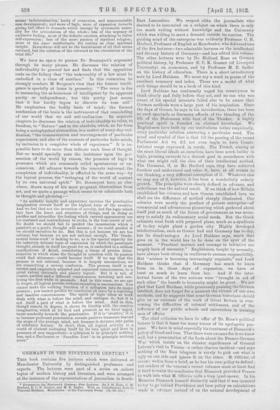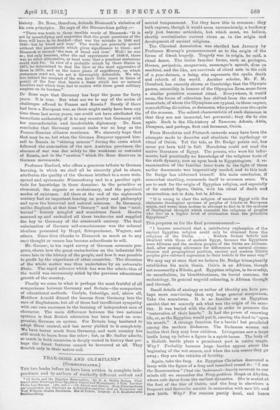GERMANY IN THE NINETEENTH CENTURY.* THIS book contains five lectures
which were delivered at Manchester University by distinguished professors and experts. The lectures were part of a series on salient topics of modern history and literature, and were arranged at the instance of the representatives of journalism in South-
• Germany in the Nineteenth Century: rive Lectures. By J. H. Rose, C. H. Herford, E. C. IC. Conner, and M. E. Sadler. With an Introductory Note hy Viscount Haldane. Manchester : at the University Press, [Ps, ed. net.]
East Lancashire. We respect alike the journalists who, desired to be instructed on a subject on.which. there is only too much writing without knowledge and the University which was willing to meet a demand outside its routine. The guiding mind of the enterprise was evidently Professor 0. H. Herford, Professor of English at Manchester, who delivered two- of the five lectures—two admirable lectures on the intellectual and literary history of Germany—and has edited this volume.. The other lectures were by Dr. Holland Rose on German political history, by Professor E. C. K. Conner (of Liverpool University) on economics, and by Professor M. E. Sadler on the history of education. There is a short introductory note by Lord Haldane. We must say a word in praise of the excellent summary and index. These are a model of what such things should be in a book of this kind.
Lord Haldane has continually urged his countrymen to think clearly and fully before they act, and no one who was. aware of his special interests failed also to be aware that German methods were a large part of his inspiration. Since the days of Greece, he says in his introduction, there has been no such spectacle as Germany affords of the blending of the life of the Statesman with that of the Thinker. A highly practical spirit is founded on abstract knowledge. We Englishmen have built up our institutions rather empirically, every particular solution answering a particular need. The proof and symbol of that is that till the passing of the recent Parliament Act we did not even begin to have Consti- tutional usage expressed in words. The French, aiming at the same liberal ideals as ourselves, have been much bolder in logic, pressing onwards to a distant goal in accordance with what one might call the elan of their intellectual method. The Germans, if, as Mr. Herford says, they have achieved freedom and understand and value it, have, at all events to our thinking, a very different conception of it. Whatever else we may say of it, however, it has been a wonderfully orderly growth. The principles were clearly defined in advance, and orderliness was the natural result. If we think of how Britain. established her colonies and bow Greece established hers, we shall see time difference of method sharply illustrated. Our colonies were mostly the product of private enterprise—of commercial and adventurous pioneering which gathered about itself just as much of the forms of government as was neces- sary to satisfy its rudimentary social needs. But the Greek colonists went forth with prepared plane, much as a syndicate of to-day might plant a garden city. Highly developed intellectualism, such as Greece had and Germany has to-day, has its disadvantages. As Lord Haldane says, much that goes on in the world has to be done on the spur of the moment. "Practical instinct and courage in initiative are largely horn of necessity." Englishmen, taught by necessity, have always been strong in readiness to assume responsibility. But "science is becoming increasingly requisite," and Lord Haldane thinks that if Germany has much to learn from us in these days of expansion, we have at least as much to learn from her. And if the intel- lectual forces of the two nations were " brought in aid of each other" the benefit to humanity might be great. We are glad that Lord Haldane, while generously praising the German intellect, does not forget for a moment the virtues of our own methods, and he suggests that some German historians should give us an estimate of the work of Great Britain in over- coming the difficulties of colonial settlement, and of the influence of our public schools and universities in training men of affairs.
The chief criticism we have to offer of Dr. Rose's political lecture is that it bears too many traces of its apologetic pur- pose. We have in mind especially his treatment of Bismarck's policy of blood and iron. That there were excuses for it we know well, but a presentation of the facts about the Franco-German War which insists on the sinister significance of General Lebrun's visit to Vienna—a rather obscure incident—and says nothing of the Ems telegram is surely to pick out what is ugly on one side and ignore it on the other. M. 011ivier, of course, writes from a brief, as lie has his own policy to defend ; but readers of the veteran's recent volumes must at least find it bard to resist time conclusion that Bismarck provoked France
to walk into what M. 011ivier calls a trap (g net-opens). In his Memoirs Bismarck himself distinctly said that it was immoral to try to go behind Providence and base policy on calculations made in advance instead of on the natural development of
history. Dr. Rose, therefore, defends Bismarck's violation of his own principles. He says of the Bismarekian policy :-
"There was truth in those terrible words of Bismarck: 'It is not by speechifying and majorities that the great questions of the time will have to be decided—that was the mistake in 1848 and 1849—but by blood and iron.' The words are generally quoted without the parenthesis which gives significance to them ; and Bismarek is termed 'the man of blood and iron.' Well I he was so; but only because, after the sad experiences of 1848-9, there was no other alternative, at least none that a practical statesman could wait for. In view of a probable attack by three States in 1871, ho determined to deal the blow at the most aggressive of them in 1870; and on the lower plane of expediency, on which statesmen must act, his act is thoroughly defensible. Wo who live behind the rampart of the sea know little (save in times of panic) of the fear that besets a State which has no natural frontiers and which then had to reckon with three great military empires on its borders."
Dr Rose says that Germany has kept the peace for forty years. It is true. But what are we to say of the aeries of challenges offered to Franco and Russia P Surely if there had been a European war, as there might easily have been any time these last seven years, one could not have attributed the immediate authorship of it to any country but Germany with
her uncomfortable and ineakulable diplomacy. Dr. Rose concludes that Germany cannot make war so long as the Franco-Russian alliance continues. We sincerely hope that that may be so, but when the German Emperor opposed him- self to Russia in "shining armour" during the crisis which followed the annexation of the now Austrian provinces, the absence of war was due solely to the weakness or restraint of Russia., not to the " caution " which Dr. Rose discovers in German movements.
Professor Herford, who offers a generous tribute to German learning, in which we shall all be sincerely glad to share, attributes the quality of the German intellect to a more wide- spread and systematic Wissensdrang and to a peculiar apti- tude for knowledge in three domains: in the primitive or elemental, the organic or evolutionary, and the psychical
modes of existence. All these at the end of the eighteenth century had an important bearing on poetry and philosophy and upon the historical and natural sciences. In Germany, unlike England, at that time " literary " and the less " intel- lectual" history mingled and sometimes fused. Goethe summed up and embodied all these tendencies and supplied
the key to Germany of the nineteenth century. The final culmination of German self-consciousness was the colossal idealism presented by Hegel, Schopenhauer, Wagner, and others. Since then (thanks to Bismarck as much as to any one) thought or reason has become subordinate to will.
Mr. Gonner, in his rapid survey of German economic pro- gress, shows how the great embarkation on the industrial life
came late in the history of the people, and how it was possible to profit by the experience of other countries. The direction of the whole matter was thus undertaken by an autocratic State. The rapid advance which has won the admiretion of
the world was enormously aided by the previous educational growth of the country.
Finally we come to what is perhaps the most fruitful of all comparisons between Germany and Britain—the comparison
of educational methods. Carlyle, Coleridge, and, above all, Matthew Arnold dinned the lessons from Germany into the ears of Englishmen, but all of them had insufficient sympathy with our own successes in the training of independent men of character. The main difference between the two national Systems is that British education has been based on com- promise, German on system. For Britain long hesitated to adopt State control, and has never yielded to it completely.
We have learnt much from Germany, and each country has still much to learn from the other ; but, as Mr. Sadler admits, so much in both countries is deeply rooted in history that per- haps the finest features cannot be borrowed at all. They flourish only in their native soil.







































 Previous page
Previous page